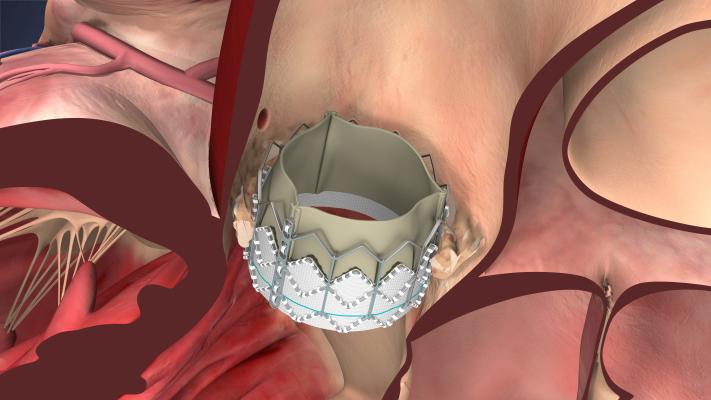
April 4, 2012 — Edwards Lifesciences Corp. reported that longer-term results (? 2 years) from the high-risk Cohort A of the PARTNER Trial – a randomized comparison of patients treated with either surgical aortic valve replacement or the Edwards Sapien transcatheter heart valve – were published in The New England Journal of Medicine. The data were concurrently presented at the American College of Cardiology's (ACC) 61st Annual Scientific Session in Chicago.
At two years, all-cause mortality for patients treated with Edwards' SAPIEN transcatheter aortic valve replacement (TAVR) was 33.9 percent, which is statistically equivalent to open heart surgical aortic valve replacement (AVR) at 35 percent. The authors concluded: "This two-year follow-up of patients in the PARTNER trial supports the use of TAVR as an alternative to surgery in selected high-risk patients with aortic stenosis. The two treatments were similar with respect to mortality, reduction in cardiac symptoms and improved valve hemodynamics.”
The presentation also included available data out to 36 months, which trended similarly.
"We are pleased that the growing body of longer-term evidence supports the Edwards Sapien transcatheter valve as an important therapy for high-risk patients," said Michael A. Mussallem, Edwards chairman and CEO. "Consistent with previous studies, the PARTNER Trial also demonstrated that, even though seriously ill patients with aortic stenosis face dismal outcomes, many do not receive life-saving surgery because of other medical risks, age or preference. This underscores the value of an alternative therapeutic option for these high-risk patients."
The authors noted that earlier results raised concerns that TAVR was responsible for increased early and, possibly, late strokes. However, over the reported follow-up period from the PARTNER Trial, the available data published showed there was no significant difference in the risk of stroke between TAVR and surgery patients.
Predictors of mortality for the overall trial cohort, as well as for each of the randomized groups, were also analyzed. The authors noted that there was a new and important observation of an association of paravalvular regurgitation after TAVR with late mortality, possibly related to factors including the ratio of the transcatheter valve size to the patient's native valve size. "Recently, the routine use of three-dimensional imaging techniques has improved annulus sizing, resulting in better selection of properly sized valves," said the authors.
The PARTNER Trial is the first randomized, controlled trial of a transcatheter aortic valve and the only trial that has follow-up data on all patients for at least two years. Cohort A of the trial enrolled between May 2007 and Sept. 2009, and studied 699 patients with severe symptomatic aortic stenosis deemed at high risk for traditional open-heart surgery. Patients were evaluated by a multi-disciplinary heart team and were evenly randomized to receive either traditional open-heart surgery or the Edwards Sapien valve with transfemoral or transapical delivery. The study represented the initial experience with TAVR at most sites, and the use of first-generation delivery systems. The PARTNER Trial achieved its primary endpoint, concluding that survival of patients treated with the Edwards Sapien valve at one year was equivalent to those treated with surgery.
The two-year data from the inoperable Cohort B of the PARTNER Trial were also published today in The New England Journal of Medicine. These data were previously presented in November 2011 at the Transcatheter Cardiovascular Therapeutics (TCT) scientific symposium.
Also in November 2011, the Sapien received U.S. Food and Drug Administration (FDA) approval for the treatment of certain inoperable patients; it is currently an investigational device for the treatment of high-risk patients in the United States and is awaiting approval. Following primary endpoint analysis, Edwards submitted one-year data from Cohort A of the PARTNER Trial to the FDA in April 2011.
For more information: www.edwards.com


 January 05, 2026
January 05, 2026 









